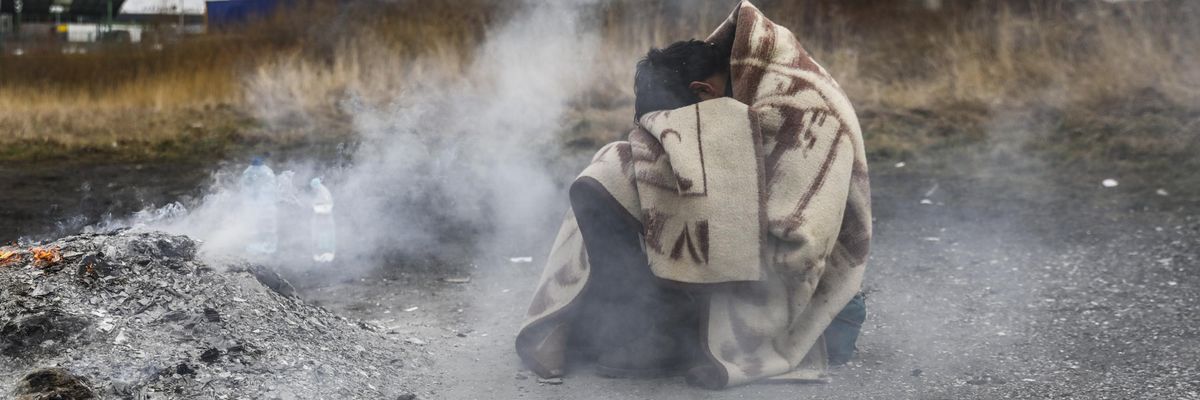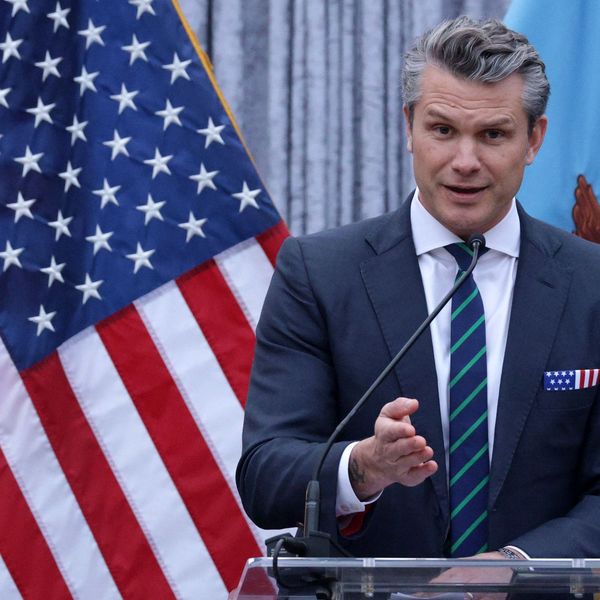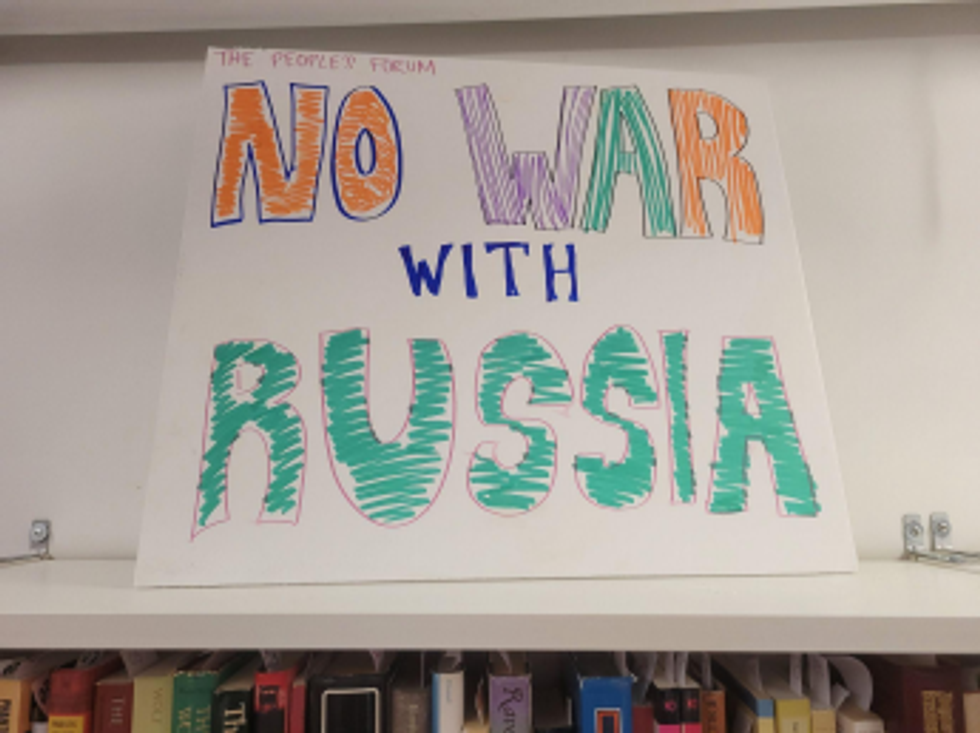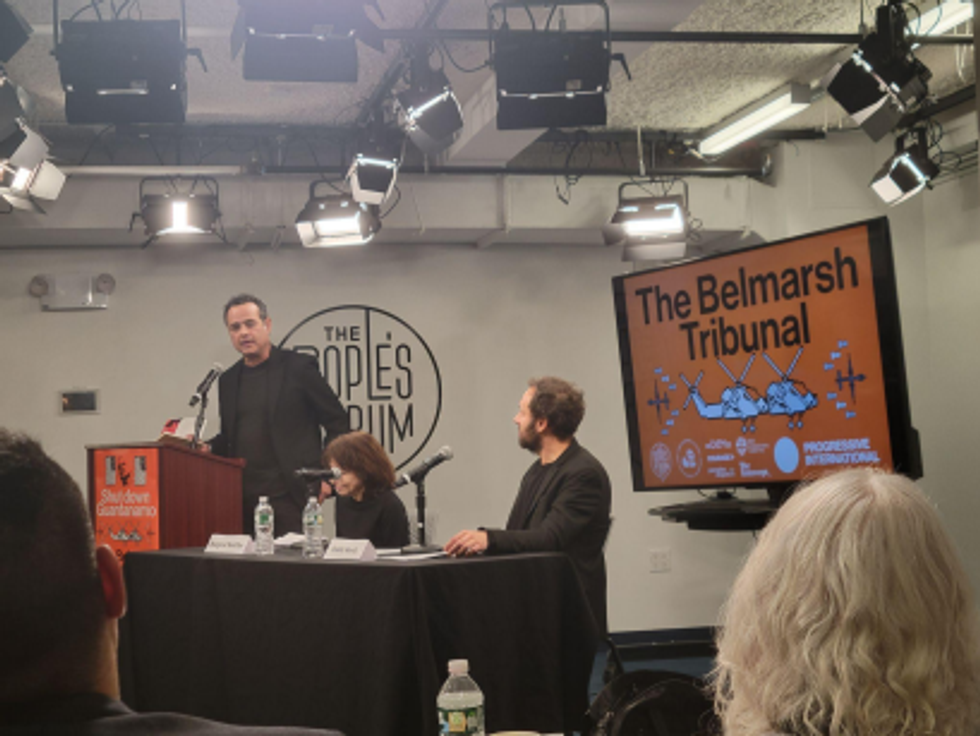
Non-Ukrainian citizens take a rest after crossing Ukrainian-Polish border due to ongoing Russian-Ukrainian war crisis, in Medyka, Poland on February 28, 2022. (Photo: Beata Zawrzel/Anadolu Agency via Getty Images)
'War Is a Crime'--The Belmarsh Tribunal Demands Accountability for the War on Terror
The Belmarsh Tribunal, first held in London in October last year, was established to bare witness to the crimes of the "War on Terror," demand accountability for the war's architects, and demand justice for its victims.
Friday was another day in what has been a constant stream of escalations of the horrifying war in Ukraine. As Putin continued his military assault on Russia's neighbor, Biden retaliated with sanctions which will inflict misery on the average Russian. Social media has seen a flood of people calling for sanctions, and some are even urging NATO to intervene militarily in the war. As all this played out, a collection of people gathered in New York City with the belief that it is still possible--and necessary--to oppose war.
"There's gonna be some people who are gonna say this is not the right time to be talking about U.S. war crimes, with Putin's illegal invasion of Ukraine in the headline."
The Belmarsh Tribunal, first held in London in October last year, was established to bare witness to the crimes of the "War on Terror," demand accountability for the war's architects, and demand justice for its victims. Its name comes from another one if its key demands--freedom for Julian Assange, the journalist who exposed U.S. war crimes during the "War on Terror." For his commitment to informing the public about the realities of war, he now languishes in Belmarsh Prison due to the United States's campaign to extradite him for trial under the Espionage Act.
On February 25, 2022, the organization Progressive International brought the tribunal to The People's Forum in New York City to reiterate these demands and put forward another: Close Guantanamo. From the orange promotion material of the event (orange to represent the prison uniforms of those held at Guantanamo Bay) to the date of the tribunal (20 years since the United States opened the brutal detention camp), this was supposed to be the key historical context of the event. However, as tribunal co-chair and Croatian philosopher, Srecko Horvat, put it in his opening remarks, "We organized the event before the atrocities that are happening before our eyes."
Poster demanding "No War With Russia" propped up on a bookshelf at The People's Forum.
For this reason the focus of the speeches remained primarily on the demands to Close Guantanamo and Free Assange. This was also because about half of the speeches were pre-recorded videos and played on a screen. Though one of the speakers drew an important connection between the current geopolitical context and the demands being made at the tribunal.
The policy director of Defending Rights and Dissent (one of the many groups that co-organized the tribunal), Chip Gibbons began his speech by noting, "There's gonna be some people who are gonna say this is not the right time to be talking about U.S. war crimes, with Putin's illegal invasion of Ukraine in the headlines... But I actually think right now, with yet another war breaking out in Europe, and people on both sides of the conflict pursuing, as opposed to diplomacy, a wider war, that this is exactly the moment in which we need to be talking about the realities of war."
Another speaker, the Marxist historian and member of Tricontinental and the International People's Assembly (two other groups that co-organized the event), Vijay Prashad put this same sentiment another way. "You know, war itself is a crime. We shouldn't be talking about war crimes. War is a crime!"
Vijay Prashad delivering testimony at the Belmarsh Tribunal
One of the most powerful testimonies to the realities of war came from a pre-recorded speech by Mohamedou Ould Slahi, who had been held and tortured at Guantanomo
Bay for 15 years. In his testimony he spoke about the experience of being arrested and imprisoned without charge or trial and the suffering his detainment at the hands of the United States put on him and his family.
Along with this testimony, the injustice of Guantanamo was further highlighted by tribunal co-chair and civil rights attorney, Margaret Kuntsler, who laid out "the background of 9/11 which is the background of 20 years of war," and how the "War on Terror" was used to create "emergency laws" which eroded basic rights, thus making an institution as inhumane and illegal as Guantanamo possible. Nancy Hollander, the criminal defense lawyer who represented two Guantanamo Bay detainees, including Mohamedou, and whistleblower Chelsea Manning, spoke in depth about her firsthand experience fighting a legal system intent on keeping the atrocities of Guantanamo in place. In a pre-recorded video, musician Tom Morello spoke about his attempt to sue the U.S. State Department after learning that his band Rage Against the Machine's music was used at Guantanamo to torture prisoners by keeping them awake 24/7.
Though the new demand to close Guantanamo Bay was put forward, the demand to free Julian Assange remained central to the event. In fact, some of the most well-known figures to testify at the tribunal put Assange at the center of their speeches. This included renowned intellectual, Noam Chomsky, who explained that "Julian Assange committed a grave transgression. He's guilty of exposing severe crimes of the U.S. government... Assange's transgression strikes at the very heart of systems of power."
Additionally, journalist Chris Hedges spoke to Assange's integrity for choosing to expose U.S. war crimes even at great cost to his freedom. Croatian theater-director and author Angela Richter spoke about her last visit with Julian Assange at the Ecuadorian Embassy in London. Nathan Fuller, director of Courage Foundation (another group that co-organized the tribunal), spoke about his experience working to get freedom for Julian Assange and the attacks he's witnessed on the journalist.
Before the famous composer Roger Waters closed out the tribunal with a recorded musical performance dedicated to Assange, philosopher and political activist Cornel West gave the final testimony, ending on a note of empowerment. "Crimes will not have the last word. Rather our voices, our movements, our joys, ours hopes, our visions and our precious love for our brothers and sisters."
An Urgent Message From Our Co-Founder
Dear Common Dreams reader, The U.S. is on a fast track to authoritarianism like nothing I've ever seen. Meanwhile, corporate news outlets are utterly capitulating to Trump, twisting their coverage to avoid drawing his ire while lining up to stuff cash in his pockets. That's why I believe that Common Dreams is doing the best and most consequential reporting that we've ever done. Our small but mighty team is a progressive reporting powerhouse, covering the news every day that the corporate media never will. Our mission has always been simple: To inform. To inspire. And to ignite change for the common good. Now here's the key piece that I want all our readers to understand: None of this would be possible without your financial support. That's not just some fundraising cliche. It's the absolute and literal truth. We don't accept corporate advertising and never will. We don't have a paywall because we don't think people should be blocked from critical news based on their ability to pay. Everything we do is funded by the donations of readers like you. Will you donate now to help power the nonprofit, independent reporting of Common Dreams? Thank you for being a vital member of our community. Together, we can keep independent journalism alive when it’s needed most. - Craig Brown, Co-founder |
Friday was another day in what has been a constant stream of escalations of the horrifying war in Ukraine. As Putin continued his military assault on Russia's neighbor, Biden retaliated with sanctions which will inflict misery on the average Russian. Social media has seen a flood of people calling for sanctions, and some are even urging NATO to intervene militarily in the war. As all this played out, a collection of people gathered in New York City with the belief that it is still possible--and necessary--to oppose war.
"There's gonna be some people who are gonna say this is not the right time to be talking about U.S. war crimes, with Putin's illegal invasion of Ukraine in the headline."
The Belmarsh Tribunal, first held in London in October last year, was established to bare witness to the crimes of the "War on Terror," demand accountability for the war's architects, and demand justice for its victims. Its name comes from another one if its key demands--freedom for Julian Assange, the journalist who exposed U.S. war crimes during the "War on Terror." For his commitment to informing the public about the realities of war, he now languishes in Belmarsh Prison due to the United States's campaign to extradite him for trial under the Espionage Act.
On February 25, 2022, the organization Progressive International brought the tribunal to The People's Forum in New York City to reiterate these demands and put forward another: Close Guantanamo. From the orange promotion material of the event (orange to represent the prison uniforms of those held at Guantanamo Bay) to the date of the tribunal (20 years since the United States opened the brutal detention camp), this was supposed to be the key historical context of the event. However, as tribunal co-chair and Croatian philosopher, Srecko Horvat, put it in his opening remarks, "We organized the event before the atrocities that are happening before our eyes."
Poster demanding "No War With Russia" propped up on a bookshelf at The People's Forum.
For this reason the focus of the speeches remained primarily on the demands to Close Guantanamo and Free Assange. This was also because about half of the speeches were pre-recorded videos and played on a screen. Though one of the speakers drew an important connection between the current geopolitical context and the demands being made at the tribunal.
The policy director of Defending Rights and Dissent (one of the many groups that co-organized the tribunal), Chip Gibbons began his speech by noting, "There's gonna be some people who are gonna say this is not the right time to be talking about U.S. war crimes, with Putin's illegal invasion of Ukraine in the headlines... But I actually think right now, with yet another war breaking out in Europe, and people on both sides of the conflict pursuing, as opposed to diplomacy, a wider war, that this is exactly the moment in which we need to be talking about the realities of war."
Another speaker, the Marxist historian and member of Tricontinental and the International People's Assembly (two other groups that co-organized the event), Vijay Prashad put this same sentiment another way. "You know, war itself is a crime. We shouldn't be talking about war crimes. War is a crime!"
Vijay Prashad delivering testimony at the Belmarsh Tribunal
One of the most powerful testimonies to the realities of war came from a pre-recorded speech by Mohamedou Ould Slahi, who had been held and tortured at Guantanomo
Bay for 15 years. In his testimony he spoke about the experience of being arrested and imprisoned without charge or trial and the suffering his detainment at the hands of the United States put on him and his family.
Along with this testimony, the injustice of Guantanamo was further highlighted by tribunal co-chair and civil rights attorney, Margaret Kuntsler, who laid out "the background of 9/11 which is the background of 20 years of war," and how the "War on Terror" was used to create "emergency laws" which eroded basic rights, thus making an institution as inhumane and illegal as Guantanamo possible. Nancy Hollander, the criminal defense lawyer who represented two Guantanamo Bay detainees, including Mohamedou, and whistleblower Chelsea Manning, spoke in depth about her firsthand experience fighting a legal system intent on keeping the atrocities of Guantanamo in place. In a pre-recorded video, musician Tom Morello spoke about his attempt to sue the U.S. State Department after learning that his band Rage Against the Machine's music was used at Guantanamo to torture prisoners by keeping them awake 24/7.
Though the new demand to close Guantanamo Bay was put forward, the demand to free Julian Assange remained central to the event. In fact, some of the most well-known figures to testify at the tribunal put Assange at the center of their speeches. This included renowned intellectual, Noam Chomsky, who explained that "Julian Assange committed a grave transgression. He's guilty of exposing severe crimes of the U.S. government... Assange's transgression strikes at the very heart of systems of power."
Additionally, journalist Chris Hedges spoke to Assange's integrity for choosing to expose U.S. war crimes even at great cost to his freedom. Croatian theater-director and author Angela Richter spoke about her last visit with Julian Assange at the Ecuadorian Embassy in London. Nathan Fuller, director of Courage Foundation (another group that co-organized the tribunal), spoke about his experience working to get freedom for Julian Assange and the attacks he's witnessed on the journalist.
Before the famous composer Roger Waters closed out the tribunal with a recorded musical performance dedicated to Assange, philosopher and political activist Cornel West gave the final testimony, ending on a note of empowerment. "Crimes will not have the last word. Rather our voices, our movements, our joys, ours hopes, our visions and our precious love for our brothers and sisters."
Friday was another day in what has been a constant stream of escalations of the horrifying war in Ukraine. As Putin continued his military assault on Russia's neighbor, Biden retaliated with sanctions which will inflict misery on the average Russian. Social media has seen a flood of people calling for sanctions, and some are even urging NATO to intervene militarily in the war. As all this played out, a collection of people gathered in New York City with the belief that it is still possible--and necessary--to oppose war.
"There's gonna be some people who are gonna say this is not the right time to be talking about U.S. war crimes, with Putin's illegal invasion of Ukraine in the headline."
The Belmarsh Tribunal, first held in London in October last year, was established to bare witness to the crimes of the "War on Terror," demand accountability for the war's architects, and demand justice for its victims. Its name comes from another one if its key demands--freedom for Julian Assange, the journalist who exposed U.S. war crimes during the "War on Terror." For his commitment to informing the public about the realities of war, he now languishes in Belmarsh Prison due to the United States's campaign to extradite him for trial under the Espionage Act.
On February 25, 2022, the organization Progressive International brought the tribunal to The People's Forum in New York City to reiterate these demands and put forward another: Close Guantanamo. From the orange promotion material of the event (orange to represent the prison uniforms of those held at Guantanamo Bay) to the date of the tribunal (20 years since the United States opened the brutal detention camp), this was supposed to be the key historical context of the event. However, as tribunal co-chair and Croatian philosopher, Srecko Horvat, put it in his opening remarks, "We organized the event before the atrocities that are happening before our eyes."
Poster demanding "No War With Russia" propped up on a bookshelf at The People's Forum.
For this reason the focus of the speeches remained primarily on the demands to Close Guantanamo and Free Assange. This was also because about half of the speeches were pre-recorded videos and played on a screen. Though one of the speakers drew an important connection between the current geopolitical context and the demands being made at the tribunal.
The policy director of Defending Rights and Dissent (one of the many groups that co-organized the tribunal), Chip Gibbons began his speech by noting, "There's gonna be some people who are gonna say this is not the right time to be talking about U.S. war crimes, with Putin's illegal invasion of Ukraine in the headlines... But I actually think right now, with yet another war breaking out in Europe, and people on both sides of the conflict pursuing, as opposed to diplomacy, a wider war, that this is exactly the moment in which we need to be talking about the realities of war."
Another speaker, the Marxist historian and member of Tricontinental and the International People's Assembly (two other groups that co-organized the event), Vijay Prashad put this same sentiment another way. "You know, war itself is a crime. We shouldn't be talking about war crimes. War is a crime!"
Vijay Prashad delivering testimony at the Belmarsh Tribunal
One of the most powerful testimonies to the realities of war came from a pre-recorded speech by Mohamedou Ould Slahi, who had been held and tortured at Guantanomo
Bay for 15 years. In his testimony he spoke about the experience of being arrested and imprisoned without charge or trial and the suffering his detainment at the hands of the United States put on him and his family.
Along with this testimony, the injustice of Guantanamo was further highlighted by tribunal co-chair and civil rights attorney, Margaret Kuntsler, who laid out "the background of 9/11 which is the background of 20 years of war," and how the "War on Terror" was used to create "emergency laws" which eroded basic rights, thus making an institution as inhumane and illegal as Guantanamo possible. Nancy Hollander, the criminal defense lawyer who represented two Guantanamo Bay detainees, including Mohamedou, and whistleblower Chelsea Manning, spoke in depth about her firsthand experience fighting a legal system intent on keeping the atrocities of Guantanamo in place. In a pre-recorded video, musician Tom Morello spoke about his attempt to sue the U.S. State Department after learning that his band Rage Against the Machine's music was used at Guantanamo to torture prisoners by keeping them awake 24/7.
Though the new demand to close Guantanamo Bay was put forward, the demand to free Julian Assange remained central to the event. In fact, some of the most well-known figures to testify at the tribunal put Assange at the center of their speeches. This included renowned intellectual, Noam Chomsky, who explained that "Julian Assange committed a grave transgression. He's guilty of exposing severe crimes of the U.S. government... Assange's transgression strikes at the very heart of systems of power."
Additionally, journalist Chris Hedges spoke to Assange's integrity for choosing to expose U.S. war crimes even at great cost to his freedom. Croatian theater-director and author Angela Richter spoke about her last visit with Julian Assange at the Ecuadorian Embassy in London. Nathan Fuller, director of Courage Foundation (another group that co-organized the tribunal), spoke about his experience working to get freedom for Julian Assange and the attacks he's witnessed on the journalist.
Before the famous composer Roger Waters closed out the tribunal with a recorded musical performance dedicated to Assange, philosopher and political activist Cornel West gave the final testimony, ending on a note of empowerment. "Crimes will not have the last word. Rather our voices, our movements, our joys, ours hopes, our visions and our precious love for our brothers and sisters."



